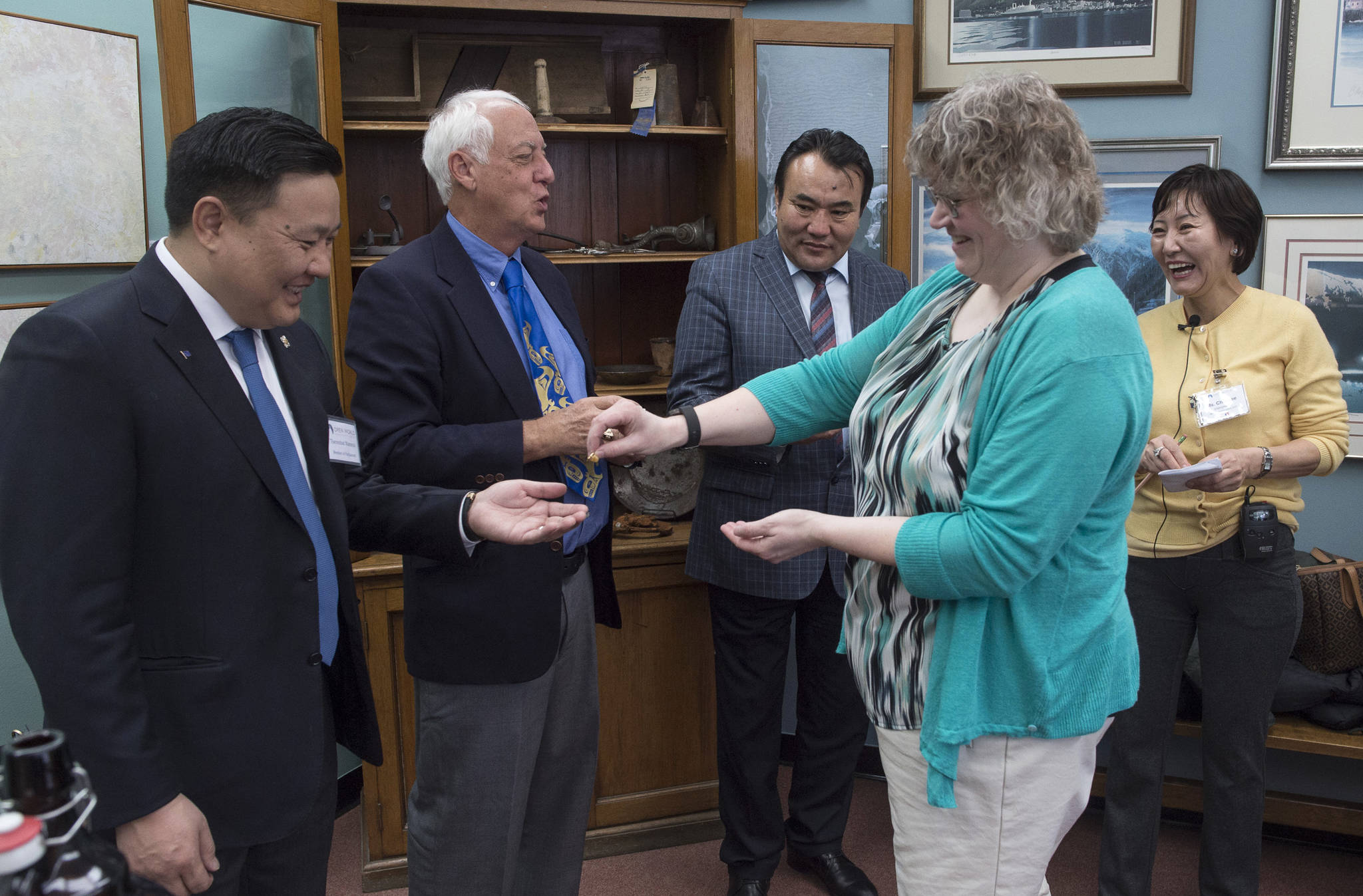After the fall of the Soviet Union in the early 1990s, Mongolia has increasingly embraced Western political ideology.
Positioned between post-communist and communist superpowers in Russia and China, the sparsely-populated nation depends on agriculture and coal but has a surprisingly cosmopolitan capital in Ulaanbaatar. As the country strives to expand their economy, they’re reaching out to America to learn how democracy can sustain free markets.
For five newly-elected parliamentarians from the country’s State Great Khural, that journey started with a U.S. Congress-sponsored trip to Juneau early this week.
“Mongolia, after living through a communist regime, it was the first country that was part of the satellite of the Soviet Union, first Central Asian country that embraced democracy in a true sense and the first Central Asian country that went into an accepted parliamentary form of democracy,” Tsogtbaatar Damdin said in a Monday talk for the Juneau World Affairs Council.
Juneau World Affairs Council sponsors lectures from leading figures in global affairs.
“We were the first to embrace this Western ideology of freedom,” Damdin said.
From there, democracy spread to other Eurasian countries.
“This is a country that was heralding the new ideology, new ideas and that was influencing other countries. … Mongolia may be small, but it can influence historical processes,” Damdin said.
The delegation was in town early this week on a diplomatic exchange through the Open World Leadership Center. The idea behind visits like these is to cross-pollinate ideas between U.S. democratic institutions and foster America’s brand of democracy in Eurasia.
During their trip, the five parliamentarians visited the University of Alaska Southeast, the Alaska State Capitol and the Mendenhall Glacier, accompanied by translator Chimgee Erdenechimeg and a representative from the U.S. embassy in Ulaanbaatar.
The trip alternated between serious intellectual exchange and lighthearted sightseeing.
On Monday, they sat down with mayor Ken Koelsch in the Assembly chambers to learn about city government. Sharing the language of bureaucracy, things got a little wonkish at the Assembly chambers.
Damdin looked comfortable in the seat usually reserved for Assembly member Jesse Kiehl. He asked about the city’s tax structure.
“Property tax is an important part of your revenue. How did the subprime mortgage crisis affect property prices here?” Damdin said.
“Juneau has always had a housing shortage and still does,” Koelsch answered. “So it was not that dramatic in scope. The last time we had a recession and threat of a capital move and oil revenue wasn’t very good, it affected property a lot here. This past year has been very stable.”
Mongolia has what’s called a unicameral parliamentary legislature. Instead of a house and a senate, the country uses a single 76-member parliament — officially known as the State Great Khural.
The insistence on bicameral structures at all levels of government struck a contrast for Damdin.
“I understand (bicameral structure) at the top level, where you really try to prevent the possibility of a dictator,” Damdin said after meeting with the mayor. “But you have it at every level down to the local level. It seems to me it could get very expensive, but that is your system and I am not here to comment on that.”
Damdin was impressed by the simplicity and accessibility of Alaska government.
The government “hears ordinary people,” and is “simple, not too complicated” that people can’t come in and understand it, he said.
Damdin has traveled on trips as a student — he studied at the Australia National University of Canberra and holds a Masters of International Law — but he said Juneau’s hospitality was world-class.
The group stayed with several families around town to get a closer look at life in Alaska.
On Tuesday, Koelsch handed over ceremonial keys to the city to five parliamentarians. The group didn’t miss a chance to pull Koelsch’s leg.
“In Mongolian tradition, if you give the key to the city, you have to have some door to open it. You also need to give that door,” Erdenechimeg deadpanned. “We are pragmatic people.”
After a pause, the room lit up with laughter.
You can watch a video of the delegation’s presentation, titled “Wisdom of the Steppes” at https://www.youtube.com/watch?v=GZdloM_bAgw
Correction & Clarification: An earlier version of this story stated the trip was sponsored by the U.S. State Department, due to misinformation provided by a University of Alaska Southeast official. The delegation’s trip was sponsored by the U.S. Congress. This article has been updated to reflect the change. This article also stated the the delegation was in Juneau on diplomatic exchange. It should be noted that this visit did not meet policy leaders definition of diplomatic exchange, and they would use the phrase “professional exhange” to describe the visit.
• Contact reporter Kevin Gullufsen at 523-2228 or kevin.gullufsen@juneauempire.com.

